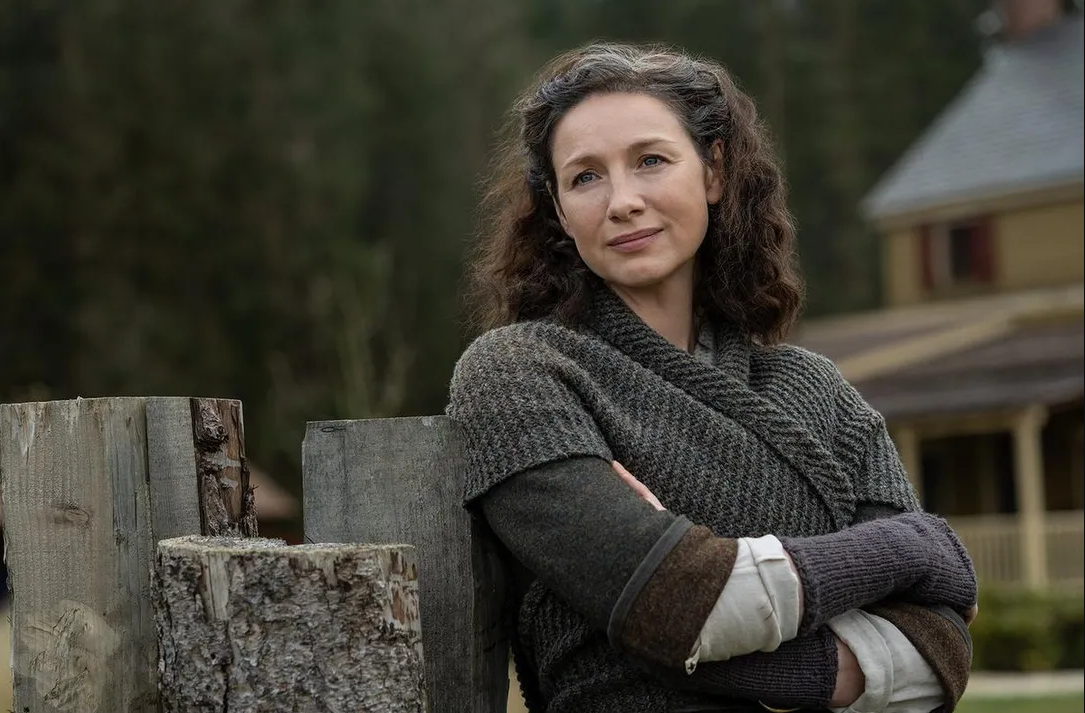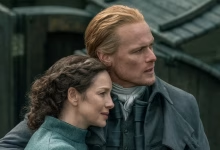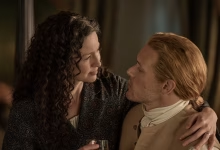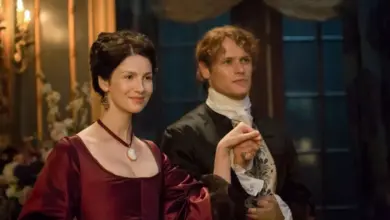On ‘Outlander’ love is many things: swoony, goofy, fatherly, complicated — and always important
Sam Heughan, Caitriona Balfe, Sophie Skelton and Richard Rankin talk about the evolution of their characters’ love stories.

The newest season of the hit drama “Outlander” opens with typically high jeopardy: its time-travelling heroine, Claire Fraser, a hangman’s noose around her neck, seemingly about to be executed for a crime she did not commit.
We won’t spoil the specifics of how Claire — who seven seasons ago fell through a stone circle portal from the 20th century to a life of endless high-stakes drama in the 18th century — survives this particular pickle, but it doesn’t feel unfair to reveal the general mechanics of her salvation.
In this, as in every other harrowing but ultimately emotionally satisfying episode of this beloved show, love — albeit a complicated, tested, flawed kind — saves the day.
“I think this show is about the enduring importance of love,” said Caitriona Balfe, the Irish actor who plays Claire on the Starz show, returning to W Network in Canada Sunday. “That, at the end of the day, that’s the most important thing.”
And while the sweeping “I’ll forsake modern plumbing to be with you” love that her character shares with a swashbuckling Highlander is the swoony hook that got most of us stuck on the series all the way back in Season 1, Balfe’s quick to point out that the show, based on a series of books by Diana Gabaldon, has now grown to encompass a whole universe of other loves.
“It’s not just our relationship,” she said. “It’s Brianna and Roger, it’s Young Ian and whoever he might be with this year …” Here she’s referring to her onscreen daughter and son-in-law, and her husband’s nephew.
“And it’s fatherly love, unrequited love, there’s so many,” added her co-star, Scottish actor Sam Heughan, who plays Jamie Fraser, a.k.a. the 18th-century Scottish laird-turned-outlaw-turned-soldier-turned-colonist-turned-whatever the impending American Revolution brings next. (This is a couple who certainly has a knack for showing up at major historical events just as they’re about to get spicy.)
When it comes to that central love story, however, both Balfe and Heughan find satisfaction in the way that it has matured and evolved across their decades-long onscreen marriage, built over 10 years of working together on the show.
“What’s great is that these characters are growing,” said Balfe. “There’s always a worry at the beginning of every season, of ‘Is there going to be something in this that’s going to feel challenging and new?’ And there always is.”
“Jamie was quite pigheaded at the start, fiery and passionate,” said Heughan. “As he’s aged, he’s gotten more stable, more calculated. He still has that fire in him, but he’s learned to control it.”
Balfe, who similarly feels her character has mellowed with age, charted the impact that maturity has had on this central bond.
“When we first met Claire and Jamie, they were very young and hotheaded and tempestuous,” she said. “There was a self-confidence of being right all the time, which is why they butted heads.”
But life — or in their case, brushes with death and unfathomable tragedy on three continents — has a way of wearing you down, she continued. “That also allows you to be more open to the possibility of other things. They’ve matured.”
Heughan concurred. “They’re a lot more honest with each other,” he said. “They always have been, but somehow this is the season where they’re far more open and more aware of what they’ve got to lose as well.”
A couple that have never struggled with frankness — perhaps to a fault — are Brianna and Roger, the Frasers’ daughter and son-in-law.
This season, thanks to a series of events we wouldn’t dare spoil, they find themselves back in the 20th century, dealing with a thoroughly modern problem: Brianna, an engineer, has become the family’s breadwinner, much to Roger’s chagrin.
“This show doesn’t shy away from difficult topics,” said Sophie Skelton, the British actor who plays Brianna. “Even last series, we had the topic of Roger and Brianna struggling to get pregnant. That’s not something that’s often talked about so candidly and it’s such a lonely experience.”
It’s in overcoming hurdles like that one, however, that Skelton feels makes this particular love story so special, particularly for a couple who haven’t always been rock solid when things get tough.
“They really are hurdling over these things together now, which is different for them and so beautiful,” she said.
Her co-star and onscreen husband, Scottish actor Richard Rankin, equally relishes the chance to explore these shifting gender dynamics.
“People are often just subject to their environment,” he said of the discomfort Roger initially feels when his wife goes off to work while he aimlessly stays at home, pining for the life they left behind in the 18th century.
“If you look at the massive change they’ve gone through, from the dangers and threats of the oncoming American Revolution to the relatively safe haven of a modern ’80s domestic life, you kind of feel like saying to Roger, ‘Who cares? Look what you’ve just come from! Just chill for a minute and enjoy life in the ’80s.’”
Still, he’s got sympathy for Roger, a product of his time and place.
“It’s not a rivalry between them,” he said. “It’s just that he’s questioning himself.”
When it comes to an “Outlander” “theology of love,” Skelton echoes Balfe.
“It’s really cool that the show gets to show that all types of dynamics can be healthy or unhealthy, but all can function and all can be fixed,” she said.
Roger and Brianna, she said, are an example of this diversity of romantic experience.
“They’re such a goofy love. It’s not as picture perfect as Jamie and Claire,” she said. “I think that’s why people relate to them.”
Theirs is not a hearts-and-flowers, swoony sort of relationship and that’s the point, said Rankin, who takes the task of portraying this dynamic — tender, jokey, willing to be awkward if that’s what it takes to fight through — very seriously.
“It’s a very complex thing to navigate on TV,” he said of the work to “find the real truth and honesty” in these scenes. “It’s a challenge that requires a lot thought and intuition, and if we get away with it then I think we’re doing OK.”
Skelton approaches it with a similar sense of duty to the characters — and the viewers.
“People want to watch the show and be taken on this sweeping journey of romance, but I think we have a responsibility to show realistic things too,” she said. “To show them that it’s OK for things not to go perfectly, for sex to be a little bit awkward, or for you to be nerdy and uncool and mess up.”
Love, she concluded, will prevail even then.
“It’s so great to be the vessels for that to people, and find the richness in that while also giving them the reality is quite a challenge,” she said, “but I feel honoured that we have that responsibility.”


